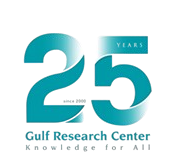Dr. Abdulaziz Sager, Chairman of the Gulf Research Center, spoke at the 21st Arab-German Business Forum organized by the Arab-German Chamber of Commerce and Industry and held in Berlin, Germany. Dr. Sager spoke about the political and economic challenges and the perspectives of Arab-German cooperation. The event was attended by more than 600 participants representing the government and the business sector. The partner country was Kuwait with H.E. Shaikh Jabir Al-Mubarak Al Hamad Al-Sabah, the Prime Minister of the State of Kuwait providing a keynote address.
Dr. Christian Koch participated in a panel discussion on “The Arab Spring: New Freedoms for Research in the Arab world?” held in the framework of the 30th anniversary of the Applied Business Language and International Management Study Program of the University of Applied Sciences, Bremen. The program covers the Arab World, China and Japan. Dr. Koch spoke about how the research environment had changed before, during and after the Arab Spring uprisings and its implications for research in the Arab world.
During a visit to Oslo, Norway and Stockholm, Sweden, Dr. Christian Koch, Director for the GRC Foundation held meetings and discussions with the following institutions:
• Norwegian Centre for Conflict Resolution (NOREF)
• Peace Research Institute Oslo (PRIO)
• Norwegian Ministry of Foreign Affairs
• Norwegian Institute for International Affairs (NUPI)
• Department of Culture Studies and Oriental Languages, University of Oslo
• Stockholm International Peace Research Institute (SIPRI)
• Swedish Defence Research Agency (FOI)
• Swedish Institute for International Affairs (UI)
• Swedish Ministry of Foreign Affairs
• Swedish International Development Cooperation Agency
As part of the meetings, the GRC and the Norwegian and Swedish institution discussed aspects of cooperation, held an exchange of views on developments in the Gulf, and focused on potential joint projects
Dr. Christian Koch participated in a day-long strategy session of the “Key States Project: The EU and Russia, Turkey, Saudi Arabia and Iran” which is organized by the Bertelsmann Foundation. The project seeks to analyze how the four key states mentioned above can more effectively linked into the EU neighbourhood policy. The meeting featured presentation by the experts on each of the four countries of the relevant policies and strategic interests followed by a discussion on how those interest can best be integrated into European policy thinking. In the fall, the strategy group will undertake field trips to Saudi Arabia, Turkey, Russia and Iran.
Dr. Christian Koch participated in a roundtable discussion entitled “Heading towards a direct confrontation? Saudi Arabia and Iran after the US withdrawal from the nuclear deal” held at the Stiftung Wissenschaft und Politik (SWP) in Berlin, Germany. The roundtable featured 20 participants from the German government and the think tank community. A key aspect was exploring what role Germany could play in trying to retain the JCPOA while calming regional tensions.
Dr. Christian Koch, Director of the GRC Foundation, attended the conference entitled “Transatlantic Think Tank Dialogue on the Middle East” held in Bonn, Germany and organized by the Konrad-Adenauer Foundation and the Center for Applied Policy Research on the Orient. During the meeting, views were exchanged on European and American positions on the current critical issues in the Middle East ranging from Syria, Iraq, Turkey and Yemen to the Saudi-Iranian rivalry and concepts of reconciliation and rehabilitation. The events brought together 25 participants representing European and U.S. think tanks. Dr. Koch gave a presentation on the current development related to the Kingdom of Saudi Arabia and how the West should position itself with regard to the transformation processes occurring in Saudi Arabia.

